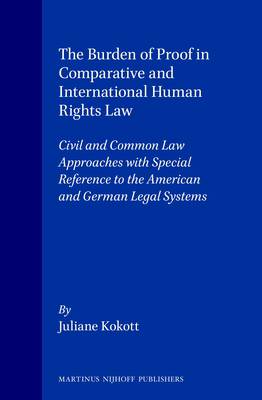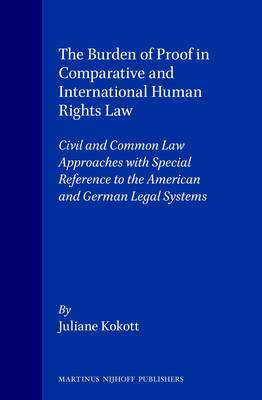
- Afhalen na 1 uur in een winkel met voorraad
- Gratis thuislevering in België vanaf € 30
- Ruim aanbod met 7 miljoen producten
- Afhalen na 1 uur in een winkel met voorraad
- Gratis thuislevering in België vanaf € 30
- Ruim aanbod met 7 miljoen producten
Zoeken
The Burden of Proof in Comparative and International Human Rights Law
Civil and Common Law Approaches with Special Reference to the American and German Legal Systems
Juliane Kokott
€ 398,45
+ 796 punten
Omschrijving
This book explores how courts decide, or ought to decide, in situations of uncertainty. A Court must always decide the case before it, even if the relevant facts remain unclear. The question then arises which party benefits and which party is burdened by that uncertainty. In these cases, the Court must apply the rules on the burden of proof or, more precisely, the burden of persuasion. Their importance for the individual claimant is obvious.
The comparison of two domestic systems (one based on common law and the other a traditional code-based legal order) with regard to the issue of burden of proof helps to clarify the terminology and lays the ground for dealing with the burden of proof in international human rights law. Without knowing what can be understood by the term `burden of proof' under domestic law, international lawyers with different domestic law backgrounds are in danger of misunderstanding each other. This may lead to obscuring the problems connected with court decisions involving uncertainty.
The study also deals with uncertainties with regard to legislative (general) in contrast to adjudicative (individual) facts and with uncertainties in the framework of predictions in contrast to uncertainties relating to historic facts.
It attempts to prepare the ground for dealing more consciously and more consistently with problems of uncertainty in international human rights law. International courts, due to their geographical and cultural distance from the case, usually have less access to the underlying facts. Nevertheless, in order to protect human rights effectively, international courts and tribunals cannot always restrict themselves to reviewing the law, but may also have to decide on the facts. Thus issues relating to decision-making on the basis of uncertain facts, including the burden of persuasion, are even more important in international than in domestic human rights law.
The comparison of two domestic systems (one based on common law and the other a traditional code-based legal order) with regard to the issue of burden of proof helps to clarify the terminology and lays the ground for dealing with the burden of proof in international human rights law. Without knowing what can be understood by the term `burden of proof' under domestic law, international lawyers with different domestic law backgrounds are in danger of misunderstanding each other. This may lead to obscuring the problems connected with court decisions involving uncertainty.
The study also deals with uncertainties with regard to legislative (general) in contrast to adjudicative (individual) facts and with uncertainties in the framework of predictions in contrast to uncertainties relating to historic facts.
It attempts to prepare the ground for dealing more consciously and more consistently with problems of uncertainty in international human rights law. International courts, due to their geographical and cultural distance from the case, usually have less access to the underlying facts. Nevertheless, in order to protect human rights effectively, international courts and tribunals cannot always restrict themselves to reviewing the law, but may also have to decide on the facts. Thus issues relating to decision-making on the basis of uncertain facts, including the burden of persuasion, are even more important in international than in domestic human rights law.
Specificaties
Betrokkenen
- Auteur(s):
- Uitgeverij:
Inhoud
- Aantal bladzijden:
- 316
- Taal:
- Engels
- Reeks:
- Reeksnummer:
- nr. 3
Eigenschappen
- Productcode (EAN):
- 9789041105707
- Verschijningsdatum:
- 1/03/1998
- Uitvoering:
- Hardcover
- Formaat:
- Genaaid
- Afmetingen:
- 163 mm x 241 mm
- Gewicht:
- 793 g

Alleen bij Standaard Boekhandel
+ 796 punten op je klantenkaart van Standaard Boekhandel
Beoordelingen
We publiceren alleen reviews die voldoen aan de voorwaarden voor reviews. Bekijk onze voorwaarden voor reviews.








